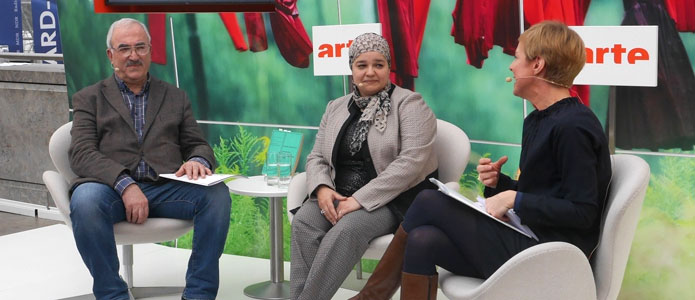Kafka in the Arabic World
Conversation About Literature at the Leipzig Book Fair

Franz Kafka is one of the most influential writers of the 20th century. What exactly fascinates Arabic readers about Kafka’s life and works? What role do his texts play in shaping aesthetic and intellectual perspectives in the Arabic-speaking world?
The Cairo-based literary scholar Hebatallah Fathy and comparative literature scholar Abdo Abboud Muenster discussed Kafka and his work in the Arabic world at the Leipzig Book Fair 2016
The Jewish author Franz Kafka, who was born 1883 in Prague and wrote in German, gained worldwide renown after his death - including in the Arab world. This is hardly surprising, given that other German language writers such as Goethe, Heidegger or Walter Benjamin also are read in Arabic. Of particular interest, however, is that in Arabic countries there is a growing fascination with Kafka as a person, and his works are experiencing something of a renaissance. All of his writings have been translated or retranslated into Arabic at the turn of the millennium, and a translation of the expansive three-volume Kafka biography by Reiner Stach is being planned in the years to come.
Has Kafka’s reception changed as a result of the Arab Spring? In what ways has his work gained a more popular following? In a panel organized by the translation promotion program, “Litrix.de”, Dr. Hebatallah Fathy, Junior Professor of Modern German Literature and literary translator (Cairo) and Abdo Abboud, Professor of Comparative Literature (Damascus / Munster) engaged in a discussion about these issues with Anne-Bitt Gerecke of Litrix.de (Goethe-Institut, Berlin), who moderated the panel at the ARTE booth during the Leipzig book Fair 2016.
NEW TRANSLATIONS PAVE THE WAY FOR A BROADER RECEPTION OF KAFKA
Hebatallah Fathy first encountered Kafka and his notions of “balance of power” and “social phobia,” during her studies at universities in Cairo and Vienna. Abdo Abboud had intensively researched Kafka within the framework of his dissertation, “German Novels in the Arabic Orient,” and also mentioned he is one of the most frequently translated writers into Arabic. In the past, Kafka’s writings had often been translated into Arabic from English, and not from the original German, which is one reason his work had been inadequately understood in the Arab-speaking world. Today, Kafka’s voice will be heard more clearly than ever, now that publishers attach special importance in having his works translated from the original language.
Hebatallah Fathy pointed out that due to the advent of online literary criticism and the increasing number of translators, the quality of translation also has improved. Arab readers will now gain a comprehensive and more easily accessible knowledge of the “Kafkaesque experience,” which no longer will be reserved for an elite circle with a command of the German language.
YOUNG READERS IDENTIFY WITH KAFKA’S CHARACTERS
Anne-Bitt Gerecke asked why Kafka’s ideas are finding such extraordinary resonance in the Arab world, and whether this interest can be linked to the recent political upheavals in the region. According to Abboud, Kafka’s writings are not political, but literary and artistic works that touch a nerve in people affected by political and social upheavals. He cited the novel, The Trial: Undoubtedly, the young people who rebelled against the dictatorship during the Arab Spring and experienced the horrors of war in their country could identify with Kafka's protagonist Josef K., who is falsely on trial for a crime that remains a mystery; or Gregor Samsa, the protagonist of Kafka's novel The Metamorphosis who wakes up one day to discover he has been transformed into a huge “bug.” By contrast, the novel The Castle has received little attention in the Arab world.
THE AESTHETIC WEALTH AND UNIVERSALITY OF KAFKA'S TEXTS
The interest in Kafka as a person also is reflected in the Arab world’s enthusiastic reading of his letters. Abdo Abboud believes this interest comes from the fact that Kafka was strongly influenced by a patriarchal society – which is something young people in the Arab world can identify with. Hebatallah Fathy however, emphasized the aesthetic richness of Kafka's writings, which leaves a lot of room for myriad personal, social and political interpretations. Many Arab writers have been influenced by Kafka and some translators have translated his works out of personal interest. Both scholars agree that Kafka’s writing is timeless and universal and this is why his works continue to resonate in our own era.
Amira Elmasry
Translation: Zaia Alexander